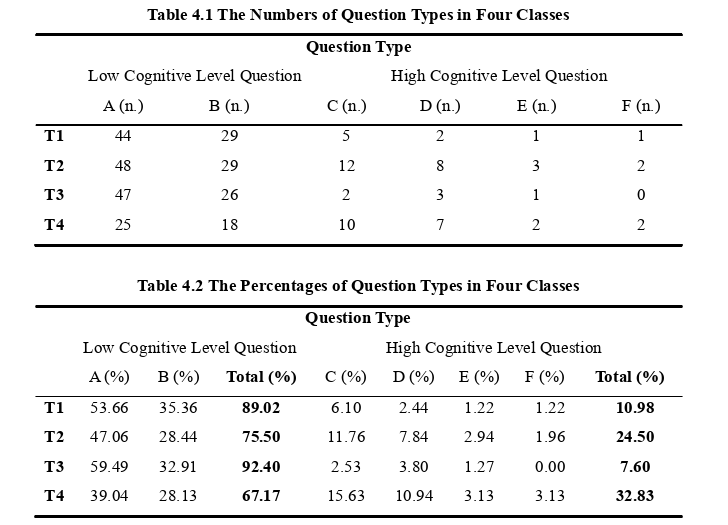联系方式
more本类最新英语论文
- 2024-01-25问题链教学模式在高一英语阅..
- 2024-01-11tpack框架在高中英语阅读教..
- 2024-01-08问题式学习在初中英语阅读教..
- 2024-01-01基于云共同体的文本解读教学..
- 2023-12-24基于语域理论的高英语阅读教..
- 2023-12-20促进深度学习的高中英语阅读..
- 2023-12-16问题导向的5e模式对初中生英..
- 2023-12-09基于图式的语块教学对培养初..
- 2023-12-03主题式教学模式对高中生英语..
- 2023-10-21学科核心素养视域下高中英语..
more热门文章
- 2009-09-22humr71-110 epistemology a..
- 2009-12-03clinical feature of chron..
- 2009-04-18浅谈大学英语阅读技巧
- 2010-03-02the importance of reading..
- 2010-03-17 cet对大学英语阅读教学的反..
- 2009-12-14unit thirty the surgical ..
- 2009-12-19unit thirty three types o..
- 2010-03-06the competence developmen..
- 2010-02-27the significance of under..
- 2014-05-29a brief analysis of schem..
more留学论文写作指导
- 2024-05-07《湖泊的一生》(节选)英汉..
- 2024-03-31卡森•麦卡勒斯小说中..
- 2024-03-28美国黑人女性心理创伤思考—..
- 2024-03-27乔治·艾略特《织工马南》中..
- 2024-03-21超越凝视:论《看不见的人》..
- 2024-03-19《哈克贝利•费恩历险..
- 2024-03-13心灵救赎之旅——从凯利的三..
- 2024-02-22文学地理学视角下的《印度之..
- 2023-05-03英、汉名词短语之形容词修饰..
- 2023-02-07目的论视域下5g—the futur..
促进深度学习的高中英语阅读课教师提问思考 [3]
论文作者:留学生论文论文属性:硕士毕业论文 thesis登出时间:2023-12-20编辑:vicky点击率:319
论文字数:49666论文编号:org202312121605395248语种:中文 Chinese地区:中国价格:$ 33
摘要:本文是一篇英语阅读论文,本研究采用质性分析工具Nvivo11,对高中英语阅读课中的教师提问进行研究。研究主要聚焦于教师提问的三个组成环节,分别是提出问题,获取答案和进行理答,然后从中选取观测点,探究如何利用教师提问帮助学生进入深度学习。
Chapter Three Methodology ............................. 26
3.1 Research Questions ...................... 26
3.2 Research Subjects ............................. 26
3.3 Research Methods .......................... 28
Chapter Four Findings and Discussion ............................. 40
4.1 The Features and Differences of Teacher Questioning Among Different Classes ................... 40
4.1.1 Teacher Questioning in The Human Traffic Signal ................. 40
4.1.2 Teacher Questioning in A Life in Sport ............................ 45
Chapter Five Conclusion ........................ 73
5.1 Major Findings ......................... 73
5.2 Pedagogical Implications ................................ 76
5.3 Limitations of the Research .......................... 77
Chapter Four Findings and Discussion
4.1 The Features and Differences of Teacher Questioning Among Different Classes
4.1.1 Teacher Questioning in The Human Traffic Signal
The Human Traffic Signal is a high school English reading text from Module 2 in Book 5 published by FLTRP. This passage is about Timoteo who sacrificed his life to voluntarily direct traffic in a dangerous area. It needs students to deeply analyze the selfless dedication and perseverance of the protagonist in this text.
The relevant data are shown in the following tables.

It can be seen from the above two tables that there are 6.10% of teachers’ questions belong to application questions, 2.44% of teachers’ questions belong to analytical questions and 1.22% belong to evaluative questions and creative questions respectively in Teacher 1’s class. In Teacher 2’s class, 11.76% of teachers’ questions are application questions, 7.84% are analytical questions, 2.94% are evaluative questions and 1.96% are creative questions. However, only 2.53% of teacher’s questions in Teacher 3’ class are application questions, 3.80% are analytical questions and 1.27% are creative questions. And in Teacher 4’s class, 15.63% are application questions and 10.94% are analytical questions, and 3.13% are evaluative questions and creative questions respectively. Moreover, the percentage of high cognitive level questions in class 4 is 32.83%, while 24.50% in class 2, 7.60% in class 3 and 10.98% in class 1. So, Teacher 2 and Teacher 4 can raise more high c本论文由英语论文网提供整理,提供论文代写,英语论文代写,代写论文,代写英语论文,代写留学生论文,代写英文论文,留学生论文代写相关核心关键词搜索。

 英国
英国 澳大利亚
澳大利亚 美国
美国 加拿大
加拿大 新西兰
新西兰 新加坡
新加坡 香港
香港 日本
日本 韩国
韩国 法国
法国 德国
德国 爱尔兰
爱尔兰 瑞士
瑞士 荷兰
荷兰 俄罗斯
俄罗斯 西班牙
西班牙 马来西亚
马来西亚 南非
南非






